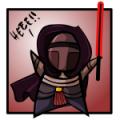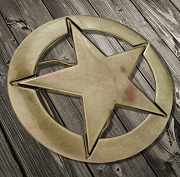|
OtspIII posted:I like this axis way better, too, I guess mainly because it's way more open to subjective interpretation than the good/evil axis. Good/Evil has way too much of a value judgement built into it, but if your only axis is Law/Chaos it makes it way more of a factional thing than an inherent one. My home game treats law/chaos as an afterlife thing--when Ragnarok comes are you going to be lined up with Odin (law), Loki (chaos), or watching from the sidelines (neutral)? It has nothing to do with your personality or even your morals and everything to do with the cosmic team you're on. Winson_Paine posted:Well it makes sense in Warhammer, Chaos is a literal thing. It is like Star Wars, if you actually have a defined absolute for what your alignments are they make sense. Light Side/Dark Side in SW is sort of arbitrary in a lot of ways, but it is not Vietnam and there are rules. It isn't really tied to poo poo in D&D, or rather it is tied to way too many horses all pulling in different directions. I admit that the idea of a Law/Chaos axis is interesting if you assume that Law and Chaos are Big Cosmic Concepts that you dedicate yourself to rather than simply "I'm an orc so I have the recessive trait for Chaotic alignment, oh well," but that sort of thing, as Winson says, assumes more of a default setting than D&D likes to own up to.
|
|
|
|

|
| # ? Jun 10, 2024 20:10 |
|
AlphaDog posted:2e does not break even a little bit if you just ignore the alignment stuff Rexides posted:I haven't played Planescape on an actual table, but Nihnoz posted:I still think the Lawful-Neutral-Chaotic axis was some good poo poo, being able to talk about the forces of Chaos or beings of Chaos or Chaos Iron that's been infused with dark Chaos Magic is really fun. I guess that's basically warhammer but still.  
|
|
|
|
There's an old article from The Escapist which defines the 9 alignments in a way that my group found useful. It gives an objective means of judging someone's alignment, it explains how and why the labels are arbitrary, and it does a good job of reconciling the labels with the fact that most people think of themselves as good. I remember the article clearly because before we discussed it alignments like Chaotic Neutral and Chaotic Evil were implicitly taboo. The moment people started seeing Chaotic Evil as Pragmatic Reasonable everyone became much more relaxed about the whole issue.Rosalind posted:Also alignment tends to mess with newer players. I have one player who chose "good" in 4E and every time he has a moral decision to make he asks me what the "good" option is. It's endearing but also deeply frustrating because I know he isn't asking himself "What would my character do?" but instead "Which choice is the good one?" and so it actually hurts roleplaying. If alignment exists to guide roleplaying, there are much better ways to do it. But of course it's a legacy mechanic and therefore has to be in there come hell or high water, right? Kai Tave posted:Oh man, I hadn't even thought of newer players who had experience with Bioware-style Paragon/Renegade reputation systems coming into contact with nine-point alignment, that's amazing. Every time a dialogue choice comes up and you don't agree with the forced mapping of morality that BioWare went with, you're given an impossible choice between either sabotaging your character's progression, or else ignoring the role-playing aspect of the game and just picking the proper colour-coded moral option. Ultimately the game encourages you not to think too hard about your choices and just go with what BioWare picked for you, because it's what's best for you. It's one of the most subtly toxic approaches to morality that I've seen. Bedlamdan posted:Is there such a thing as a good pen and paper morality system? Humanity in Vampire, for example, never really felt very fun or interesting. Because I guess, maintaining humanity was supposed to be unfun and problematic. In this sense, I don't see that divorcing D&D's alignments from mechanics for Next as a bad thing. It's certainly better than what they used to do with alignments. Lymond fucked around with this message at 04:44 on Jun 27, 2013 |
|
|
|
"Despite the problems of alignment, throwing out alignment is the wrong move for most campaigns." "To ignore alignment is to ignore the most powerful themes that underlie gaming's popular genres." Wow, way to sell me on your argument, maybe you can tell me more about how wrong my game is? "It's All Clear Once You Realize Lawful Just Means Deontological" I'm not saying the article is wrong, but it seems entirely like an afterthought justification for the rules. Spending five pages to explain a 3x3 grid seems pretty rear end-backward to me.
|
|
|
|
it reads like the million other times some poor soul has tried to explain alignment.
|
|
|
|
Lymond posted:The BioWare Morality Meter is awful. The system gives you serious incentives to gain points on only one side of the moral spectrum, points add up slowly over time, and choices are binary. The game encourages you to 'pick a side' (or a style, for Mass Effect) and be consistent with it. Unfortunately unless you happen to be an android infused with the amalgamated moral compasses of BioWare's writers, you're penalised for being inconsistent to a morality scheme that is often going to feel strange or arbitrary to you. Well when you put it that way it sounds a lot like how D&D handles Paladins and falling, so maybe they have more n common than I thought. If you go and read 3.X Eberron it becomes pretty apparent that Keith Baker is trying really, really hard to do everything but come right out and say "alignment is dumb, just ignore it," but he can't do that because as an official D&D setting Eberron couldn't just throw ingrained D&D concepts out even if part of the point of Eberron is that while Fundamental Good and Evil exist they're tremendous outliers on the edge of everything else which is made up mostly of shades of grey, not in the grim "everyone is some sort of rear end in a top hat" sense that people usually think of when you say "shades of grey" but just in the sense that there aren't any designated "evil nations" or "evil races," just folks with all sorts of different motivations for doing what they do...nationalism, greed, a personal code, ambition, whatever. And this approach, keeping the alignment system but trying to show that it wasn't a hard-and-fast absolute, had its own problems. For instance pretty much any time somebody wrote something about the Church of the Silver Flame, an ostensibly Lawful Good religion, they all decided that it would be a really clever idea to present an NPC who was a member of the Church but was actually evil, dun dun dunnnnn. But because everybody had this idea simultaneously what you ended up with was the impression that the Silver Flame was absolutely shot through with evil, nothing but a thin veneer of goodness over a terminally rotten core, when by all accounts the Silver Flame is actually supposed to be a genuinely good organization with some problematic elements here and there.
|
|
|
|
How's about looking at it from the opposite end? Is there anything that alignment models that can't be explained in a different way? The most obvious good/bad I can think of is star wars, but even that can be seen as 'intellectual vs instinctual'. I can't think of any story where 'good' and 'bad' are actual gameworld things - more often, the hero's journey is to learn about morality through the story. e: I'm thinking of Labyrinth here - the adventure starts when the hero does a 'bad' thing ("I wish the goblins would take you away"), and the entire point of the story is her learning how hard it is to do the 'good' thing (rescuing the baby). Cut and replace with your fantasy story of choice. Having a pre-scripted alignment defeats the entire point of that story. How can a paladin know that they're good unless they're tested, etc. petrol blue fucked around with this message at 04:55 on Jun 27, 2013 |
|
|
|
The best alignment system is and always shall be the one from the Freebase RPG inside of HOL. The two axes are Liberal <-> Conservative and Granola <-> Establishment. As you may have guessed, Richard Nixon is CE.
|
|
|
|
Literally steal alignment from the MegaTen series. Law is equal parts peace, order, totalitarianism, and elitism. It is the abandonment of both selfishness and creativity, bigotry and individuality. Those few who obey absolutely are given peace - but those who err are kicked out or killed outright. Chaos is absolute personal liberty, freedom of choice, mind, and body - but also war and unsuppressed vice, where the strongest thrive and do and take all that they want. Neutral, while the most idealistic, is also the most difficult and, to many, the most cowardly. Those on the two sides likely see them as wishy washy, too scared to choose - and often enough they are correct. They are often driven to isolation by the two opposing powers.
|
|
|
|
ProfessorCirno posted:Literally steal alignment from the MegaTen series. Barring that, use the color-wheel from Magic the Gathering and figure out which color (or set of colors) represent you.
|
|
|
|
Lymond posted:The BioWare Morality Meter is awful. The system gives you serious incentives to gain points on only one side of the moral spectrum, points add up slowly over time, and choices are binary. The game encourages you to 'pick a side' (or a style, for Mass Effect) and be consistent with it. Unfortunately unless you happen to be an android infused with the amalgamated moral compasses of BioWare's writers, you're penalised for being inconsistent to a morality scheme that is often going to feel strange or arbitrary to you. The Bioware morality meter? You're going to have to be more specific. KOTOR and Jade Empire gave you pluses and minus up and down the scale, which has the effect that you're suggesting, although there weren't actually that many mechanical bonuses for pushing to the end of either scale, but their later games are completely different. Mass Effect (the one Kai mentioned) allows you to gain points on either side, and tries to be more about 'ruthless force versus negotiation and compromise' than good versus evil. Mind you I think their best morality system is Dragon Age, which has none at all. Alignment systems really don't seem to do anything but restrict your options. At best they're there to tell you that it's totally okay to kill orcs and hope you don't actually question that.
|
|
|
|
Bedlamdan posted:Barring that, use the color-wheel from Magic the Gathering and figure out which color (or set of colors) represent you. Speaking of which, a while back, I found this post that explains how to do exactly that: http://www.giantitp.com/forums/showthread.php?t=157001
|
|
|
|
Oh, I forgot, there was an rpg with a morality system I really liked. There's a game called Mystic Empyrean where points you put into personality characteristics, like Humble or Bloodthirsty, determined the abilities you get. The fun thing was that it was the other players who put in the points for you: for example, if you felt that Jane was particularly bloodthirsty when she ripped off that guy's head, then you give her a point of Bloodthirstiness. This would let her do things like form armor and weapons from her own body, and at higher levels give her the ability to shrug off damage but also weakens her when she's not killing. I thought this was pretty clever, and there's a metric gently caress-ton of abilities mapped to personality traits: for example, someone who is Controlling gets the power to command beasts, someone who is Brave can empower allies.
|
|
|
|
The concepts behind planescape of belief shaping reality was interesting and the actual struggle of the planes was evocative, it just had the misfortune of being stretched onto the double albatrosses of alignment and the pre-existing planes. And it didn't really fit. Belief shapes the planes, great... so why the hell do the planes look the way they do? Ok, Mechanus is the epitome of lawful, and thus is shaped like endless gears, I get the metaphor (even though this plane is partly supported by the beliefs of lawful individuals whose civilizations have yet to invent gears), and Limbo represents absolute chaos and has no real consistent shape or form whatsoever. So... what about the others? If Mechanus and Limbo are pure Law and pure Chaos, then Elysium and the Gray Waste must be pure Good and pure Evil, respectively. The first is a pretty nice place to visit (and lifted from Greek mythology), while the second is a grab-bag of mythological underworlds, slapping together Hades from Greek Mythology on top of Niflheim from Norse Mythology (though Hades and Elysium are at opposite poles, Niflheim is Absolute (Neutral) Evil while Ysgard is... "chaotic good neutral". Where Shinto or Hindu pantheons hang is beyond me.). The planes are shaped by belief, and when you get a high enough concentration of ideologies into one area it snaps into another plane. But there are seventeen planes, not nine or thirty-three or sixty-five and these planes are distinct rather than a continuous blend, so they probably represent some sort of clear ideology. So when a neutral good lawful dies and winds up on Bytopia, the petitioner thinks "oh wow, never before has my mindset and way of life been so totally encapsulated in an image as it has been in this combination of a mountain facing a meadow"... so, what exactly is that ideology, and how does it differ from the Lawful Good of Celestia and the Neutral Good of Elysium? "Bytopia: We're kind of ok with legal systems (but not entirely)" "Bytopia: I must remain within site of a mountain at all times (Dwarves go back to Celestia)" "Bytopia: Idyllic Agrarian Lifestyles for Work Addicts" "Bytopia: They can't all be winners" And then you get things like druids, the embodiment of nature... AD&D 2e PHB posted:True Neutral: True neutral characters believe in the ultimate balance of forces, and they refuse to see actions as either good or evil. Since the majority of people in the world make judgements, true neutral characters are extremely rare. True neutrals do their best to avoid siding with the forces of either good or evil, law or chaos. It is their duty to see that all of these forces remain in balanced competition. Meanwhile, the plane most associated with nature and animals and the whole "gently caress/kill/eat" mentality, is the Beastlands, a Neutral Good Chaotic plane, making it more good-aligned than the Chaotic Good Neutral plane of Ysgard, home of the vikings. Did some great power decide to make an Elmyra-esque grab for the souls of all things fuzzy wuzzy in the world, so that when individuals of a certain temperament (and not druids) died they'd be turned into talking animals who hunt each other forever? While any of these planes are acceptable as a novelty place to travel and adventure (except Bytopia), the setting is at odds with its concepts and doesn't really stand up to any degree of strain owing to its patchwork design history. Planescape is a good game in spite of D&D, not because of D&D.
|
|
|
|
LightWarden posted:Planescape is a good game in spite of D&D, not because of D&D. This. It gets even better if the weirdnesses you described are literally the result of Powers doing stuff exactly like "make an Elmyra-esque grab for the souls of all things fuzzy wuzzy in the world". Why are the Viking gods all in a a Chaotic Good Neutral place? Because they went there and nobody could stop them so they stayed
|
|
|
|
There's a new playtest survey you can use to tell the Next team that their game is terrible and they should bring back martial healing, competent fighters and whatnot. Not that it would accomplish anything at this stage or that they would at least read it, but still...
|
|
|
|
FRINGE posted:I bet youre just full of opinions about people that say that exact thing about 4e arent you? In fact, I am, that's why I made sure to preface my opinion by saying that I could be wrong about it because I haven't experienced Planescape properly. People can still hold opinions about a Thing even if they haven't thoroughly experienced it, as long as they are aware that this could mean they are wrong. LightWarden posted:The concepts behind planescape of belief shaping reality was interesting and the actual struggle of the planes was evocative, it just had the misfortune of being stretched onto the double albatrosses of alignment and the pre-existing planes. And it didn't really fit. Yeah, this is what I was talking about, not that towns shifting planes is a stupid idea by itself, but basing it on alignments is stupid. Winson_Paine posted:You are lucky I don't ban people for terrible opinions. The Outlands rule. It's ok, I'll just keep thinking about how awesome Planescape is and my account will materialize again.
|
|
|
|
Rexides posted:Yeah, this is what I was talking about, not that towns shifting planes is a stupid idea by itself, but basing it on alignments is stupid. We always mostly or totally ignored alignment. That did present a small problem with Planescape, but the town shifting thing works fine if you look at it like this: There's this town in the outlands. It's full seafaring people with longships who follow the Norse gods, raid and pillage, have a culture based on being a warrior, and are just generally fantasy vikings. If they do their thing hard enough, the town moves to Asgard. If instead they get all disillusioned and depressed and the crops fail and the raiding ships don't return and it's just generally bleak and awful, they move to Niflheim. Substitute cultures and gods and heavens/hells for whatever fantasy dudes are in your town. So your average fantasy culture will usually have towns that end up in Mount Celestia or The Abyss, depending. Yeah those are archetypal LG/CE things, but you don't need those descriptors.
|
|
|
|
Played a session of Lair of the Dracolich in a party of four. I played a Oak Circle druid, with the intent of doing some helpful combat stuff and healing everyone, while the others mostly played melee brawlers. I know it was meant to be four groups of people playing the dungeon, but it seemed like we had a decent amount of trouble keeping health up, so the DM had to let me just straight up get free casts of cure wounds during short rests for us to have enough steam to reach the Dracolich. Mostly I just found that combat got pretty exhausting with having to go through an encounter on most of the rooms, and me being restricted to either cowering behind something and dispensing healing/buffs via familiar or having to use up my limited spell slots to drop the Moonbeam. I'd be more tempted to suggest we play more sessions in some kind of setting where we got more exploration between fights, and possibly more important single enemies.
|
|
|
|
Since we're tossing out alignment ideas that will never happen: Stop making alignment be about morality and focus on the "grand external force" thing. Your alignment stops being "Chaotic" as a descriptor of your outlook, it becomes "Chaos" as in actual alignment with the grand force. Then move past the Law/Chaos Axis. "Nature" could be an alignment. A specific God could be one. Dedicate yourself to abstract concepts like "Justice" and "Freedom". Someone dedicated to martial prowess could pick "War" or just "Combat" and face everything in life as a battle. Get powerful enough and you become a walking avatar of whatever alignment you chose. The bad guys can pick stuff like "Evil" and "Destruction" so you know to punch them. They can still describe how you approach situations as an RP tool, and are vastly more interesting. They might even stop nerds from trying to treat alignments as a complete system of morality for real life.
|
|
|
|
Rulebook Heavily posted:Since we're tossing out alignment ideas that will never happen: So basically alignments become non-mechanical 13A backgrounds? That's interesting.
|
|
|
|
I took the latest survey, it's actually a little more like a grownup survey for adults. There are still a lot of leading questions and the usual stuff, but I had an opportunity to convey my experience with the last D&D day (nobody was interested in the dracolich lair because it was competing with free rpg day) and my discontent with Next overall. I realize it won't help, but I feel slightly better.
|
|
|
|
Rulebook Heavily posted:Since we're tossing out alignment ideas that will never happen: It's a terrible 3eism to just say "no problem, use the magic rules!" but as a starting point you could do a lot worse than getting players to pick a couple of Cleric domains.
|
|
|
|
I did the new survey; I've got no doubts whatsoever anything I said will be completely ignored (especially since I commented that I don't like their one new mechanic (Advantage/Disadvantage) as it stands and rounded off by remarking that the only sacred cows in Dungeons and Dragons shouldn't be six attributes, Vancian casting and Bull Rush but, er, dungeons and dragons), but hey, at least I got to say it.
|
|
|
|
Rulebook Heavily posted:Since we're tossing out alignment ideas that will never happen: I'm not sure about "Never Happen". This is pretty much how D20 Modern did it- you didn't have alignment, but "Allegiances" that could be to 'abstract principle of good or evil' but could also be "My boss" or "The church" or what have you. (And you could have up to 3, or none at all.) Mostly it just gave a circumstance bonus on skill checks when interacting with someone of the same allegiance, but there were items and advanced classes tied to specific allegiances in the magic settings. It probably could have gone a lot farther than it did, though, since most of them were just "Allegiance: Good" or "Allegiance: Evil" pre-reqs. I was looking forward to "Allegiance: S-mart" based weapons or what have you.)
|
|
|
|
Rodney uses Module! It's not very effective.quote:For example, if we have a robust, point-and-bonus-based skill system module, that will need to alter some class features for classes that are traditionally thought of as skill-focused, like the bard, monk, ranger, or rogue. When possible, we’ll want to make other rules modules (especially those that add to the game’s mechanics, rather than changing them outright) function with no changes to the base classes, which should help integrate the module into the game more smoothly. --They are removing the requirement that paladins (and presumably monks?) be lawful from the core rules, so you can indeed be a paladin of justice or freedom or carbohydrates. --Asked about what "Legendary" status means vis-a-vis the question of whether or not a horde of weaklings could kill a legendary dragon, he waffles, pleads that they're very early in the design process for that, and says that he would tailor the monster's abilities to suit what they want it to do. (Perhaps a peasant army could kill a dragon, but not the Tarrasque, since that would defeat the point of the tarrasque.) I think this means that "Legendary" was an ill-considered idea that they will completely abandon except as a label to put on monster statblocks, with no mechanical implications. The only good idea to come from Mearls' musings on Legendary Monsters was statting the monster's lair, i.e. balance the encounter, not just the monster. But that's a concept that doesn't need to be restricted to high-level challenges and doesn't need a special Legendary label.
|
|
|
|
Halloween Jack posted:--They are removing the requirement that paladins (and presumably monks?) be lawful from the core rules, so you can indeed be a paladin of justice or freedom or carbohydrates. This is a good thing. One of my favorite things about 4e's Divine Power book was a breakdown of how different clerics and paladins and the like serve different deities in different ways. Some of my favorites: Divine Power posted:Corellon Divine Power posted:Sehanine It made things a hell of a lot more interesting than "beep beep boop boop all paladins must be lawful good."
|
|
|
|
Namagem posted:So basically alignments become non-mechanical 13A backgrounds? That's interesting. It could even come with an optional mechanical attachment, like chrisyoa's idea of letting everyone gain access to a clerical domain based on their alignment, or be easily available (use a feat, gain a domain power appropriate to your alignment- this would have the added benefit of not having domains exist only to serve one type of character). The point is, if the idea is to put in something that acts as an RP guide and something that tells people about your character, you can do a hell of a lot better than assign the good/evil/lawful/chaotic axis for absolutely everyone and everything. "Nature" says a lot about a character, even if it doesn't say whether the character will do good or evil in service to nature, whether they will protect it or even whether they'll oppose the encroachment of civilization with force. Alignments are very D&D, so they're in to stay. But there's nothing that says that "Alignment" automatically has to mean "Lawful Good". If that is such an iconic phrase that it must be preserved like the +1 sword is, let people pick two - "Law" and "Good" - and just add more neat ideas into it from there.
|
|
|
|
Kai Tave posted:Well when you put it that way it sounds a lot like how D&D handles Paladins and falling, so maybe they have more n common than I thought. As a guy who doesn't know poo poo about Eberron except what other people have told me, I honestly thought that this was what the Silver Flame was about, beside the fact that their leader is a little girl. So yeah, it seems like it was completely hosed!
|
|
|
|
Kai Tave posted:Well when you put it that way it sounds a lot like how D&D handles Paladins and falling, so maybe they have more n common than I thought. To be wholly fair no one's quite sure what the Silver Flame actually is as it speaks with 3 voices, 2 of which are the coutl and Paladin that fused together to make it while trying to kill a demon. The 3rd is some dark unknown voice that's vaguely hinted at being that demon. Getting 1/3rd of your orders from Satan doesn't exactly help foster trust in a group, especially after said flame sends them off to wipe out several races.
|
|
|
|
Sure, the Silver Flame (both the church and the quasi-deific force it's named after) are supposed to have a bit of darkness in them, but it's not supposed to be like some JRPG church where you know by the second act that it'll turn out they were working for Satan all along and responsible for all the world's ills. It's just that, like how wannabe comic book writers always come up with the same idea for an awesome Punisher story where the Punisher kills an innocent person and turns himself in/kills himself/goes even crazier, everybody had the same awesome idea to highlight the fact that in Eberron you could have an Evil alignment and belong to a Lawful Good church whoahhhhhhhhh, and so it wound up presenting this skewed picture of what it was supposed to be. In trying to work against the ingrained assumptions of D&D alignment they wound up distorting things in a completely unintended fashion.
|
|
|
|
From what I recall the original idea of the Silver Flame is that, while it has a little bit of darkness in it, it is generally a currently good organization with Jaela calling the shots and trying to make up for the whole "mass genocide" thing, but is mired in a mix of corruption and older church leaders who are opposed to her and want a return to the old "templar" days. The "darkness" was always presented as being starkly weaker then the other two parts, whispering only at those it knew it could influence easily, rather then being a big bad power in of itself. Most of the problems with the church are entirely human ones. I mean that's like the core tenant of Eberron's take on alignment - "gently caress it." Good people with good intentions do horrible things. Evil monsters without a soul do good things.
|
|
|
|
As someone who has designed surveys for a living, if they are actually legitimately reading surveys (and part of me doubts that they are) this is what's going to happen: 1. Intern is given all the comments boxes. Reads through them a couple times and comes up with numeric codes to assign them based on general themes. 2. Every comment is then assigned to a certain numerically coded theme. 3. The numbers for each code are added up and are the only thing the people in charge actually see except maybe some choice quotes from 1-3 comments. So if you want to have an impact, each comment should be brief, to-the-point with a strong, easily distilled theme. Don't sound insane. Don't sound angry. Those get tossed out sometimes. Also here is a great bit of grog that a friend said to me when I posted all my recommendations about Next and why trying to capture what is "fundamentally" D&D is stupid: quote:The twenty-sided die is "fundamental" to D&D. Since I invalidated the first thing you said I didn't pay any credence to anything else you said either. Please try to have the persepctive that millions of people have played more than a half-dozen editions of Dungeons and Dragons before you ever picked up 4th Edition. Rosalind fucked around with this message at 02:06 on Jun 28, 2013 |
|
|
|
The use of quotes around "fundamental" is highly correct, at least.
|
|
|
|
Kai Tave posted:Sure, the Silver Flame (both the church and the quasi-deific force it's named after) are supposed to have a bit of darkness in them, but it's not supposed to be like some JRPG church where you know by the second act that it'll turn out they were working for Satan all along and responsible for all the world's ills. It's just that, like how wannabe comic book writers always come up with the same idea for an awesome Punisher story where the Punisher kills an innocent person and turns himself in/kills himself/goes even crazier, everybody had the same awesome idea to highlight the fact that in Eberron you could have an Evil alignment and belong to a Lawful Good church whoahhhhhhhhh, and so it wound up presenting this skewed picture of what it was supposed to be. In trying to work against the ingrained assumptions of D&D alignment they wound up distorting things in a completely unintended fashion. And yet, so far as I can tell, they normally miss the equally obvious but much more interesting stories that could be told round the Blood of Vol. (One of these days I want to play a LG Paladin or Invoker of the Blood of Vol who, if he ever found out what was really behind the Blood and could be brought to believe it would end up thinking that the fraud had become reality and the inner circle was deluding themselves).
|
|
|
|
Kai Tave posted:Well when you put it that way it sounds a lot like how D&D handles Paladins and falling, so maybe they have more n common than I thought.
|
|
|
|
The 9 alignments work because it's a lovely mechanic that's just open-ended enough for everybody to interpret what it means to them and how they think it should work, or which fictional characters embody which alignments.
|
|
|
|
The thing about the whole "mass genocide" bit is that lycanthropes the world over really did go no-fooling batshit crazy and start killing and/or infecting pretty much anybody they could get their hands on. It's not like the Silver Flame woke up en masse one day and said "man, I really want to get my murder on, let's go start a crusade," that lycanthropes really did go killfrenzy crazy was a thing that really did happen for no explicable reason. There's a lot of factors at play there, including flawed scholarly research led people to believe that there was no such thing as a non-evil lycanthrope (because both the non-savage and murdery kind were rarer by default and a lot of good lycanthropes were progressively becoming evil) and that there was no cure for the affliction (because either A). natural lycanthropes can't be cured period and B). those who contract it can only be cured if they want to and lyncanthropy fucks with your personality), and also because the then-head of the Church decided to use the crusade as an excuse to consolidate more power and so yeah, it definitely wasn't a good thing, but it also wasn't Warhammer Fantasy style where the church decided that if you were born with six fingers then welp, time to burn at the stake.
|
|
|
|
ProfessorCirno posted:I mean that's like the core tenant of Eberron's take on alignment - "gently caress it." Good people with good intentions do horrible things. Evil monsters without a soul do good things. See also the good aligned queen ready to restart the Last War because drat it, she'd be a great ruler, while the evil vampire is doing everything he can to prevent it because he's wise enough to know it'll ruin things for everyone. What I am saying is Karrnath Uber Alles.
|
|
|
|

|
| # ? Jun 10, 2024 20:10 |
MadScientistWorking posted:There is nothing subtle about the church though as he basically wrote with both extremes. The only reason why i think that the evil tends to be emphasized is that you really have to be a hosed up organization to allow the mass genocide as described to occur where as the good faction tends to exhibit common human decency. The genocide thing was interesting, because D&D lycanthropy is actually the kind of fundamentally horrible thing that actual, decent people might try to purge from the face of the earth. 3e Lycanthropy is a moral disease; it doesn't just change you into a werewolf, but it also fundamentally alters your alignment and personality. It literally makes good men evil. quote:A character with awareness of his condition retains his identity and does not lose control of his actions if he changes. However, each time he changes to his animal form, he must make a Will save (DC 15 + number of times he has been in animal form) or permanently assume the alignment of his animal form in all shapes. It's not like vampirism, where you die and your soul is in limbo while an undead version of you occupies your body. Contracting D&D lycanthropy requires you to make a will save vs. permanent catastrophic personality alteration. That's pretty amazingly horrible, in a world where death is easier to reverse than alignment shift. Also, because there are thirteen moons, there's a full moon in Eberron pretty much every other night. It's werewolf central.
|
|
|
|





 Similarly, Corruption in Dark Heresy and the various other Warhammer RPGs was meant to be annoying pain that you're supposed to actively avoid or somehow work around. I guess I was okay with the Light Side/Dark Side mechanics in Star Wars Saga Edition (though perhaps that was just because the section on it seemed fairly well written).
Similarly, Corruption in Dark Heresy and the various other Warhammer RPGs was meant to be annoying pain that you're supposed to actively avoid or somehow work around. I guess I was okay with the Light Side/Dark Side mechanics in Star Wars Saga Edition (though perhaps that was just because the section on it seemed fairly well written).





























